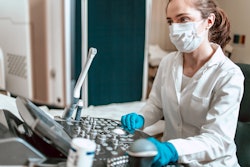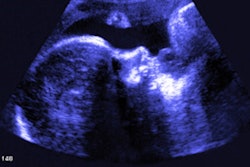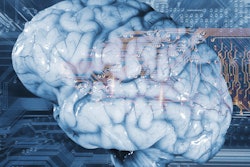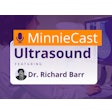AI could help sonographers find fetal abnormalities faster without sacrificing diagnostic quality, according to research published March 27 in the New England Journal of Medicine.
A team led by Thomas Day, PhD, from King’s College London in England, found that AI sped up scan times by more than eight minutes and achieved high marks in detecting fetal malformations.
“We hope that using AI in these scans will free up precious time for sonographers to focus on patient care, making the experience more comfortable and reassuring for parents,” Day said in a prepared statement.
Previous studies suggest that AI can help improve the performance of screening fetal anomaly ultrasound scans. Ultrasound scans are performed around 18 to 20 weeks’ gestation to check for the overall health of the fetus.
Day and colleagues studied whether AI significantly affects fetal ultrasound scanning, focusing on diagnostic performance, biometry, scan duration, and sonographer cognitive load.
The randomized, single-center, open-label trial included 78 pregnant women (26 with fetal CHD) and 58 sonographers were recruited. Of the pregnant women, 26 had fetal congenital heart disease (CHD).
The sonographers scanned the women with and without AI assistance and were blinded to fetal CHD status. The AI models identified and saved 13 standard image planes and measured four biometrics. However, they did not automate CHD diagnosis.
AI-assisted scanning led to higher diagnostic performance compared to non-AI-assisted scanning. Additionally, it led to faster scan times.
| Comparison of AI-assisted fetal ultrasound scanning vs. standard scanning | ||
|---|---|---|
| Measure | Standard scanning | AI-assisted scanning |
| Sensitivity | 81.5% | 88.9% |
| Specificity | 92.2% | 98% |
| Scan time | 19.7 minutes | 11.4 minutes |
The team used the NASA Task Load Index (NASA TLX) to score cognitive load for the sonographers. (NASA TLX is a tool that rates perceived workload for task assessment, with higher scores indicating higher workloads.)
Sonographers who used AI help had an average NASA TLX score of 35.2 compared with an average 46.5 score observed for sonographers who did not use AI.
The researchers also highlighted that the AI repeatability and reproducibility were superior to manual measurements for all biometrics. The AI models took “several thousand” snapshots of each fetal measurement compared with three taken by a sonographer.
Finally, no adverse events occurred during the trial, the team noted.
The study authors suggested that AI assistance could improve the accuracy of assessing fetal growth and health, helping medical professionals make decisions earlier to improve newborn health outcomes.
They added that with such aid, sonographers may face fewer interruptions in their work, owing to less need to pause, save images, or measure during scans.
The full study can be accessed here.



















